八年级上英语比较级最高级
- 格式:docx
- 大小:90.43 KB
- 文档页数:6
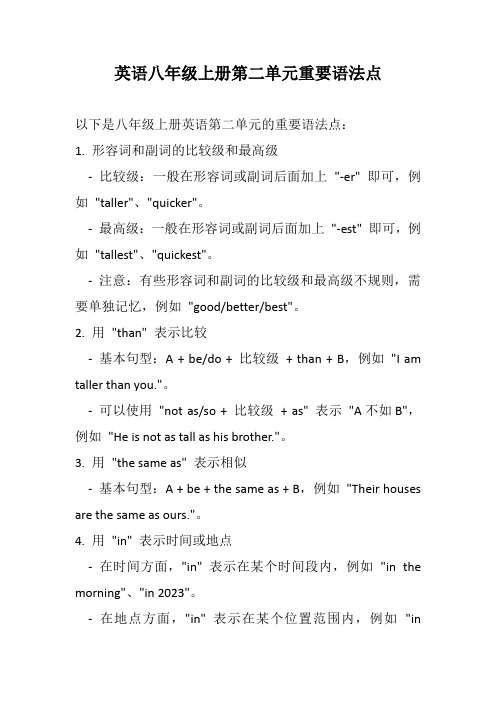
英语八年级上册第二单元重要语法点以下是八年级上册英语第二单元的重要语法点:1. 形容词和副词的比较级和最高级- 比较级:一般在形容词或副词后面加上"-er" 即可,例如"taller"、"quicker"。
- 最高级:一般在形容词或副词后面加上"-est" 即可,例如"tallest"、"quickest"。
- 注意:有些形容词和副词的比较级和最高级不规则,需要单独记忆,例如"good/better/best"。
2. 用"than" 表示比较- 基本句型:A + be/do + 比较级+ than + B,例如"I am taller than you."。
- 可以使用"not as/so + 比较级+ as" 表示"A不如B",例如"He is not as tall as his brother."。
3. 用"the same as" 表示相似- 基本句型:A + be + the same as + B,例如"Their houses are the same as ours."。
4. 用"in" 表示时间或地点- 在时间方面,"in" 表示在某个时间段内,例如"in the morning"、"in 2023"。
- 在地点方面,"in" 表示在某个位置范围内,例如"inBeijing"、"in the school"。
5. 用"on" 表示时间或地点- 在时间方面,"on" 表示在某个具体日期或时间点上,例如"on Monday"、"on my birthday"。
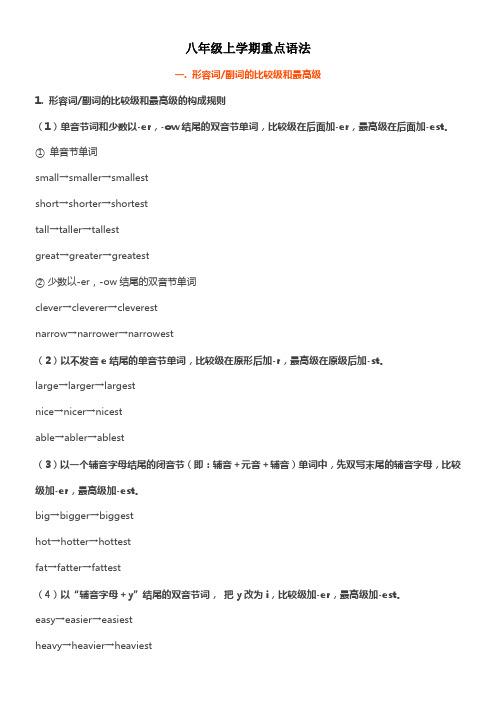
八年级上学期重点语法一. 形容词/副词的比较级和最高级1. 形容词/副词的比较级和最高级的构成规则(1)单音节词和少数以-er,-ow结尾的双音节单词,比较级在后面加-er,最高级在后面加-est。
①单音节单词small→smaller→smallestshort→shorter→shortesttall→taller→tallestgreat→greater→greatest②少数以-er,-ow结尾的双音节单词clever→cleverer→cleverestnarrow→narrower→narrowest(2)以不发音e结尾的单音节单词,比较级在原形后加-r,最高级在原级后加-st。
large→larger→largestnice→nicer→nicestable→abler→ablest(3)以一个辅音字母结尾的闭音节(即:辅音+元音+辅音)单词中,先双写末尾的辅音字母,比较级加-er,最高级加-est。
big→bigger→biggesthot→hotter→hottestfat→fatter→fattest(4)以“辅音字母+y”结尾的双音节词,把y改为i,比较级加-er,最高级加-est。
easy→easier→easiestheavy→heavier→heaviestbusy→busier→busiesthappy→happier→happiest(5)其他双音节词和多音节词,比较级在前面加more,最高级在前面加most。
beautiful→more beautiful→most beautifuldifferent→more different→most differenteasily→more easily→most easily(6)有少数形容词、副词的比较级和最高级是不规则的,必须熟记。
good→better→bestwell→better→bestbad→worse→worstill→worse→worstold→older/elder→oldest/eldestmany/much→more→mostlittle→less→leastfar →further/farther→furthest/farthest2. 形容词和副词比较级的用法(1)“甲+be+(倍数)+形容词比较级+than+乙”表示“甲比乙…”或“甲比乙…几倍”。
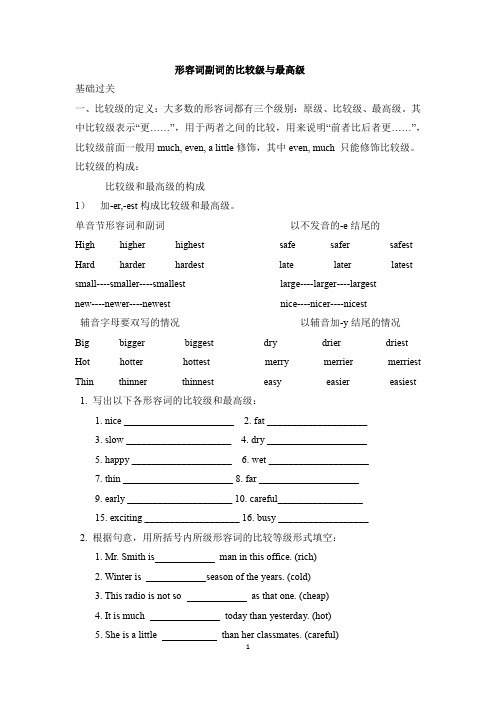
形容词副词的比较级与最高级基础过关一、比较级的定义:大多数的形容词都有三个级别:原级、比较级、最高级。
其中比较级表示“更……”,用于两者之间的比较,用来说明“前者比后者更……”,比较级前面一般用much, even, a little修饰,其中even, much 只能修饰比较级。
比较级的构成:比较级和最高级的构成1)加-er,-est构成比较级和最高级。
单音节形容词和副词以不发音的-e结尾的High higher highest safe safer safest Hard harder hardest late later latest small----smaller----smallest large----larger----largestnew----newer----newest nice----nicer----nicest辅音字母要双写的情况以辅音加-y结尾的情况Big bigger biggest dry drier driest Hot hotter hottest merry merrier merriest Thin thinner thinnest easy easier easiest 1. 写出以下各形容词的比较级和最高级:1. nice ______________________2. fat ____________________3. slow _____________________4. dry ____________________5. happy ____________________6. wet ____________________7. thin ______________________ 8. far ____________________9. early _____________________ 10. careful_________________15. exciting ___________________ 16. busy __________________2. 根据句意,用所括号内所级形容词的比较等级形式填空:1. Mr. Smith is man in this office. (rich)2. Winter is season of the years. (cold)3. This radio is not so as that one. (cheap)4. It is much today than yesterday. (hot)5. She is a little than her classmates. (careful)6. people came to the meeting than last time. (many)7. Which book is , this one or that one? (easy)8. My room is than yours. (small)9. Hainan is from Beijing than Hunan. (far)10. Skating is than swimming. (exciting)11. Jim is than all the others. (honest)12. The higher you climb, the it will be. (cold)13.There are boys than girls in our class. (few)2) 加more, most构成比较级和最高级多音节的形容词由形容词加-ly构成的副词expensive more expensive most expensive slowly more slowly most slowly carefully more carefully most carefully highly more highly most highly 以-ful,-less,-able,-ous,-ive, -ing等结尾的双元音形容词useless more useless most uselessserious more serious most serious分词形容词tired,pleased及glad,often,real, right,wrong等单音节形容词。
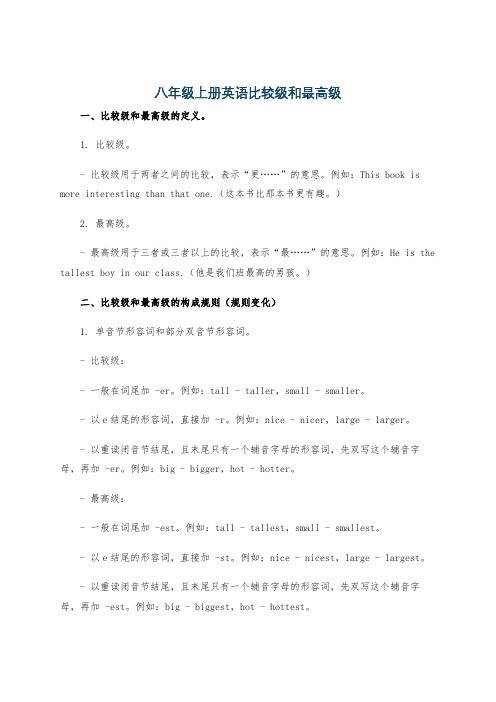
八年级上册英语比较级和最高级一、比较级和最高级的定义。
1. 比较级。
- 比较级用于两者之间的比较,表示“更……”的意思。
例如:This book is more interesting than that one.(这本书比那本书更有趣。
)2. 最高级。
- 最高级用于三者或三者以上的比较,表示“最……”的意思。
例如:He is the tallest boy in our class.(他是我们班最高的男孩。
)二、比较级和最高级的构成规则(规则变化)1. 单音节形容词和部分双音节形容词。
- 比较级:- 一般在词尾加 -er。
例如:tall - taller,small - smaller。
- 以e结尾的形容词,直接加 -r。
例如:nice - nicer,large - larger。
- 以重读闭音节结尾,且末尾只有一个辅音字母的形容词,先双写这个辅音字母,再加 -er。
例如:big - bigger,hot - hotter。
- 最高级:- 一般在词尾加 -est。
例如:tall - tallest,small - smallest。
- 以e结尾的形容词,直接加 -st。
例如:nice - nicest,large - largest。
- 以重读闭音节结尾,且末尾只有一个辅音字母的形容词,先双写这个辅音字母,再加 -est。
例如:big - biggest,hot - hottest。
2. 多音节形容词和部分双音节形容词。
- 比较级:在形容词前面加more。
例如:beautiful - more beautiful,interesting - more interesting。
- 最高级:在形容词前面加most。
例如:beautiful - most beautiful,interesting - most interesting。
三、不规则变化的形容词比较级和最高级。
1. good/well - better - best(好的)2. bad/badly - worse - worst(坏的;糟糕地)3. many/much - more - most(许多)4. little - less - least(少的)5. far - farther/further - farthest/furthest(远的;进一步的)四、比较级和最高级的用法。

第一章比较级、最高级变化一览表规则变化1。
单音节以及少数双音节的词尾加上“er" “est”构成比较级、最高级:bright(明亮的)—brighter—brightest broad(广阔的)—broader—broadestcheap(便宜的)—cheaper-cheapest clean(干净的)—cleaner—cleanest clever(聪明的)—cleverer—cleverest cold(寒冷的)—colder-coldestcool(凉的)—cooler—coolest dark(黑暗的)—darker—darkestdear(贵的)—dearer-dearest deep(深的)—deeper—deepestfast(迅速的)—faster—fastest few(少的)—fewer—fewestgreat(伟大的)-greater—greatest hard(困难的,硬的)-harder-hardesthigh(高的)—higher—highest kind(善良的)—kinder-kindestlight(轻的)—lighter-lightest long(长的)-longer-longestloud(响亮的)—louder—loudest low(低的)-lower—lowestnear(近的)—nearer—nearest new(新的)—newer—newestpoor(穷的)—poorer—poorest quick(快的)—quicker—quickestquiet(安静的)—quieter—quietest rich(富裕的)—richer-richestshort(短的)—shorter-shortest slow(慢的)—slower—slowestsmall(小的)—smaller—smallest smart(聪明的)—smarter—smartestsoft(柔软的)-softer-softest strong(强壮的)—stronger-strongestsweet(甜的)—sweeter-sweetest tall(高的)-taller — tallest thick(厚的)—thicker—thickest warm(温暖的)-warmer—warmestweak(弱的)-weaker—weakest young(年轻的)-younger-youngest2以一个元音加一个辅音字母结尾的单音节词(即重读闭音节词),双写结尾的辅音字母er,-est big(大的)—bigger—biggest fat(胖的)—fatter—fattesthot(热的)—hotter—hottest red(红的)—redder—reddestsad(伤心的)—sadder—saddest thin(瘦的)—thinner-thinnestwet(湿的)—wetter—wettest mad(疯的)—madder—maddest特别提醒:new, few, slow, clean等词含有字母组合,且发的是长元音,不用双写。


八年级上册英语第四单元语法一、形容词的比较级和最高级。
1. 构成规则。
- 一般在词尾加 -er(比较级)和 -est(最高级)。
- 例如:tall - taller - tallest;small - smaller - smallest。
- 以不发音的e结尾的形容词,加 -r和 -st。
- 例如:nice - nicer - nicest;large - larger - largest。
- 以“辅音字母 + y”结尾的形容词,把y变为i,再加 -er和 -est。
- 例如:heavy - heavier - heaviest;busy - busier - busiest。
- 重读闭音节且末尾只有一个辅音字母的形容词,双写这个辅音字母,再加 -er 和 -est。
- 例如:big - bigger - biggest;hot - hotter - hottest。
- 部分双音节和多音节形容词,在前面加more(比较级)和most(最高级)。
- 例如:beautiful - more beautiful - most beautiful;interesting - more interesting - most interesting。
2. 用法。
- 比较级的用法。
- 用于两者之间的比较,表示“更……”。
- 结构:A+be动词/实义动词+形容词比较级+than + B。
- 例如:My sister is taller than me.(我的姐姐比我高。
)- He runs faster than his brother.(他跑得比他哥哥快。
)- 比较级前可以用much, a little, a bit, even等词来修饰,表示程度。
- 例如:This book is much more interesting than that one.(这本书比那本有趣得多。
)- She is a little shorter than her friend.(她比她的朋友矮一点。

人教版丨八年级上册英语主要语法——形容词比较级和最高级一.变化规则:大多数形容词和副词有比较级和最高级的变化,即原级、比较级和最高级,用来表示事物的等级差别。
原级即形容词的原形,比较级和最高级有规则变化和不规则变化两种。
(1)单音节词加词尾-er,-est来构成比较级和最高级。
tall(高的) taller tallestgreat(巨大的) greater greatest(2)以不发音的e结尾的单音节词只加-r,-stnice(好的) nicer nicestlarge(大的) larger largestable(有能力的) abler ablest(3)以一个辅音字母结尾的闭音节单音节词,双写结尾的辅音字母,再加-er,-est big(大的) bigger biggesthot热的) hotter hottestred红色的redder reddest(4)"以辅音字母+y"结尾的双音节词,改y为i,再加-er,-esteasy(容易的) easier easiestbusy(忙的) busier busiest(5)以ly结尾的副词,除early-earlier-earliest,其他都是加more most. Slowly-more slowly-most slowlyBravely-more bravely-most bravelyquickly-more quickly-most quickly(6)少数以-er,-ow结尾的双音节词未尾加-er,-estclever(聪明的) cleverer cleverestnarrow(窄的) narrower narrowest(7)其他双音节词和多音节词在前面加more,most来构成比较级和最高级。
如:important(重要的) more important most importanteasily(容易地) more easily most easily(8)一些词的比较级和最高级,可以加-er或-est,也可以加more或most,如:clever, polite等。
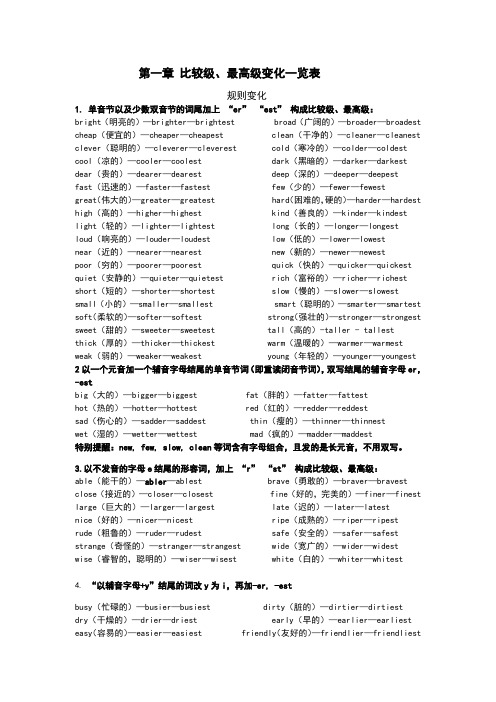
第一章比较级、最高级变化一览表规则变化1.单音节以及少数双音节的词尾加上“er”“est”构成比较级、最高级:bright(明亮的)—brighter—brightest broad(广阔的)—broader—broadestcheap(便宜的)—cheaper—cheapest clean(干净的)—cleaner—cleanest clever(聪明的)—cleverer—cleverest cold(寒冷的)—colder—coldestcool(凉的)—cooler—coolest dark(黑暗的)—darker—darkestdear(贵的)—dearer—dearest deep(深的)—deeper—deepestfast(迅速的)—faster—fastest few(少的)—fewer—fewestgreat(伟大的)—greater—greatest hard(困难的,硬的)—harder—hardesthigh(高的)—higher—highest kind(善良的)—kinder—kindestlight(轻的)—lighter—lightest long(长的)—longer—longestloud(响亮的)—louder—loudest low(低的)—lower—lowestnear(近的)—nearer—nearest new(新的)—newer—newestpoor(穷的)—poorer—poorest quick(快的)—quicker—quickestquiet(安静的)—quieter—quietest rich(富裕的)—richer—richestshort(短的)—shorter—shortest slow(慢的)—slower—slowestsmall(小的)—smaller—smallest smart(聪明的)—smarter—smartestsoft(柔软的)—softer—softest strong(强壮的)—stronger—strongestsweet(甜的)—sweeter—sweetest tall(高的)-taller - tallest thick(厚的)—thicker—thickest warm(温暖的)—warmer—warmestweak(弱的)—weaker—weakest young(年轻的)—younger—youngest2以一个元音加一个辅音字母结尾的单音节词(即重读闭音节词),双写结尾的辅音字母er,-estbig(大的)—bigger—biggest fat(胖的)—fatter—fattesthot(热的)—hotter—hottest red(红的)—redder—reddestsad(伤心的)—sadder—saddest thin(瘦的)—thinner—thinnestwet(湿的)—wetter—wettest mad(疯的)—madder—maddest特别提醒:new, few, slow, clean等词含有字母组合,且发的是长元音,不用双写。
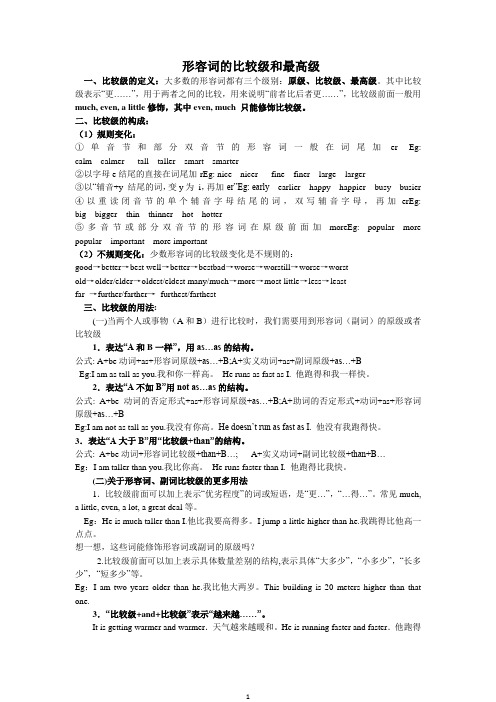
形容词的比较级和最高级一、比较级的定义:大多数的形容词都有三个级别:原级、比较级、最高级。
其中比较级表示“更……”,用于两者之间的比较,用来说明“前者比后者更……”,比较级前面一般用much, even, a little修饰,其中even, much 只能修饰比较级。
二、比较级的构成:(1)规则变化:①单音节和部分双音节的形容词一般在词尾加-er Eg: calm---calmer tall---taller smart---smarter②以字母e结尾的直接在词尾加-rEg: nice---nicer fine---finer large---larger③以“辅音+y 结尾的词,变y为i,再加-er”Eg: early---earlier happy---happier busy---busier④以重读闭音节的单个辅音字母结尾的词,双写辅音字母,再加-erEg: big---bigger thin---thinner hot---hotter⑤多音节或部分双音节的形容词在原级前面加moreEg: popular---more popular important---more important(2)不规则变化:少数形容词的比较级变化是不规则的:good→better→best well→better→bestbad→worse→worstill→worse→worstold→older/elder→oldest/eldest many/much→more→most little→less→leastfar →further/farther→furthest/farthest三、比较级的用法:(一)当两个人或事物(A和B)进行比较时,我们需要用到形容词(副词)的原级或者比较级1.表达“A和B一样”,用as…as的结构。
公式: A+be动词+as+形容词原级+as…+B;A+实义动词+as+副词原级+as…+BEg:I am as tall as you.我和你一样高。

形容词,副词的比较级、最高级变化规则.一般在词尾直接加er或est,例如,tall-taller-tallest,long-longer-longest2.以不发音的字母e结尾的单词在词尾直接加r或st,例如,nice-nicer-nicest3.以辅音字母+y结尾的词,把y变为i,再加er或est,例如,heavy-heavier-heaviest4.重读闭音节,末尾只有一个辅音字母,双写这个辅音字母,再加er或est,例如,big-bigger-biggest fat thin red wet5.部分双音节词和多音节词分别在原级前加more构成比较级和most构成最高级,例如,slowly-more slowly-most slowly;beautiful-more beautiful-most beautiful ( tired often )二、不规则变化原级比较级最高级good/well better bestmany/much more mostbad/ill/badly worse worstlittle less leastold older/elder oldest/eldestfar farther/further farthest/furthestⅣ形容词,副词等级的用法一、原级的用法1.只能修饰原级的词,very,quite,so,too例如,He is___________to walk on.他太累了以至于不能再继续走了。
My brother runs _______________I can‘t follow him.我弟弟跑得那么快以至于我跟不上他。
2.原级常用的句型结构(1)“甲+动词+(倍数)+as+形容词原级+as+乙”表示“甲和乙程度相同”或“甲是乙的几倍”例如,汤姆和凯特年龄一样大。
______________________________________________ 汤姆和迈克跑得一样快。
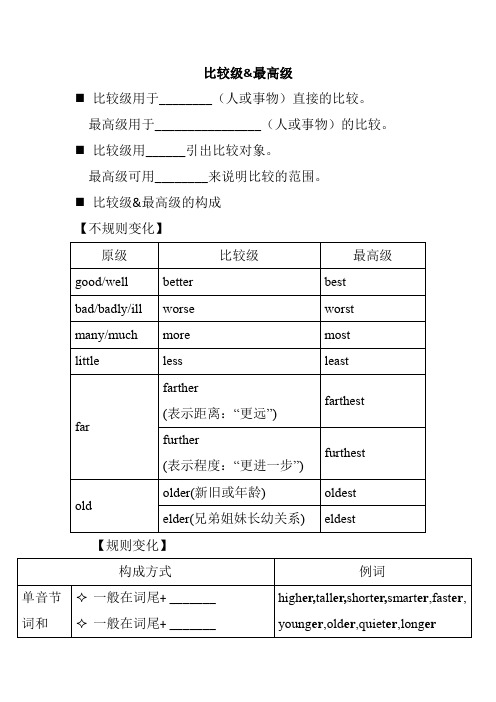
比较级&最高级⏹比较级用于________(人或事物)直接的比较。
最高级用于________________(人或事物)的比较。
⏹比较级用______引出比较对象。
最高级可用________来说明比较的范围。
⏹比较级&最高级的构成【不规则变化】【规则变化】friendly —friendlier/more friendlyshy —shyer/shier 【不考】比较级用法1.同级比较①肯定形式:as + adj./adv. + as “和...一样”结构:_____________________________________ _____________________________________Eg. Amy is as tall as Peter. Eg. I work as hard as Tina.②否定形式:not as + adj. /adv. + as 不如…结构:_____________________________________ _____________________________________Eg.Amy is not as/so tall as Peter. 艾米没有皮特高。
Eg.I can’t jump as high as Bill. 我跳高不如比尔。
2.用法:A比B更...结构:_____________________________________ _____________________________________Eg. I am more outgoing than my sister.Eg.Nelly danced better than Lisa.【not as/so…as 可与比较级进行同义句的转换】This room is not as /so big as that one.=That room is bigger than this one.3.用法:越来越…结构:_____________________________________ _____________________________________Eg.Eg.4.用法:越……,越…….结构:_____________________________________Eg.The more careful you are,the fewer mistakes you’ll make.你越认真,你犯的错误就越少。
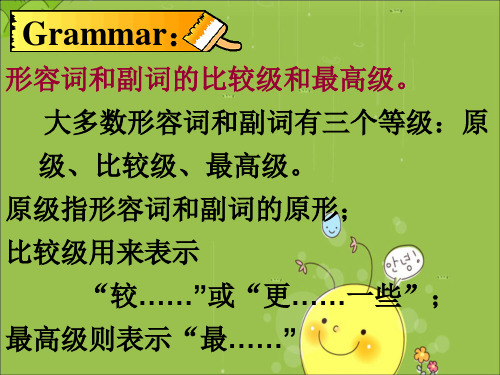


人教版八年级上英语语法总结Jenny was compiled in January 2021人教版八年级上英语语法总结八年级上册内容,形容词和副词的比较级和最高级,句子成分,类型,简单句的五种基本句型,宾语从句,各种时态包括一般现在时,现在进行时,一般过去时,一般将来时,情态动词和动词不定式等,具体内容如下:一、形容词和副词的比较级和最高级1)单音节形容词的比较级和最高级形式是在词尾加-er和-est构成。
great(原级)greater(比较级)greatest(最高级)2)以-e结尾的单音节形容词的比较级和最高级是在词尾加-r和-st构成。
wide(原级)wider(比较级)widest(最高级)3)少数以-y,-er,-ow,-ble结尾的双音节形容词的比较级和最高级是在词尾加-er和-est构成。
clever(原级)cleverer(比较级)cleverest(最高级)4)以-y结尾,但-y前是辅音字母的形容词的比较级和最高级是把-y去掉,加上-ier和-est构成.happy(原形)happier(比较级)happiest(最高级) 5)以一个辅音字母结尾其前面的元音字母发短元音的形容词的比较级和最高级是双写该辅音字母然后再加-er和-est。
big(原级)bigger(比较级)biggest(最高级)6)双音节和多音节形容词的比较级和最高级需用more和most加在形容词前面来构成。
beautiful(原级)difficult(原级)morebeautiful(比较级)moredifficult(比较级)mostbeautiful(最高级)mostdifficult(最高级)形容词比较级的用法:形容词的比较级用于两个人或事物的比较,其结构形式如下:主语+谓语(系动词)+形容词比较级+than+对比成分。
也就是,含有形容词比较级的主句+than+从句。
注意从句常常省去意义上和主句相同的部分,而只剩下对比的成分。
八年级上英语比较级最
高级
GE GROUP system office room 【GEIHUA16H-GEIHUA
形容词的比较级和最高级
一、规则变化:
1、一般直接在词尾加er; est
eg:tall—taller--tallest light—lighter--lightest
2、以字母e结尾的直接加r; st
eg: nice—nicer—nicest fine—finer—finest
3、以辅音字母加y结尾的形容词,要变y为i再加er; est
eg: heavy—heavier—heaviest busy—busier--busiest
4、以重读闭音节结尾且末尾只有一个辅音字母的形容词,要双写末尾的辅音字母再加er; est eg: thin—thinner--thinnest
hot—hotter—hottest big—bigger—biggest
(注:双写必须同时符合以下条件a.以辅音字母+元音字母+辅音字母结尾;b.中间的元音字母发单元音;c. 重读闭音。
一般满足前两个条件多为双写的词)
5、多音节形容词或部分双音节形容词变比较级在前面加more,最高级在前加most
eg: beautiful—more beautiful—most beautiful
important—more important—most beautiful
二、不规则形容词的比较级最高级
注:older 一般指年龄大小;eg: My father is older than my mother.
elder指长幼关系(一般修饰名词作定语);
eg: My elder brother is a driver.
farther指距离更远;
further指抽像的. eg: I want to study English further.
further reading
形容词比较级的用法
1、两者之间的比较,句中有明显的标志词than
eg: Tom is taller than John
2、Which/Who is + 比较级, A or B ?
eg: Which is easier, maths or English?
3、能修饰比较级的副词及短:much(…的多)、a lot(…的多)、even(更…)、still(更…)、a bit(…一点儿)
This city is much more beautiful than that one
Today is even hotter than yesterday.
4、… is the +比较级 + of the two.
Tom is the taller of the two boys. 汤姆是这两个男孩中最高的
5、…数量 + 比较级 than …
My father is three years older than my mother.
6、比较级+ and + 比较级,“越来越…”
Now it is hotter and hotter. 现在越来越热
7、The + 比较级…,the + 比较级…“越…,就越…”
The more , the better. 越多越好。
The more you eat, the fatter you will become.你吃得越多,你就越容易变胖
注: Tom is the tallest boy in his class.
=Tom is taller than any other boy in his class.
=Tom is taller than the other boys in his class.
形容词原级的用法
1、very、so、quite、too等词后用原级
2、too … to ; so … that ;as … as 中间用原级
A + be + not as/so + 原级+ as
B A不及B…
形容词最高级的用法
1、the+最高级+ of/in (三者及以上范围的)
eg: My mother is the busiest in my family
2、one of the + 最高级 + 名词复数 + in/of
eg: Shenzhen is one of the biggest cities in China
3、the + 序数词 + 最高级 + 名词 + in/of
eg: The Yellow River is the second longest river in China 4、Which/Who is the + 最高级,A ,B or C ?
eg: Which is the biggest , the moon, the earth or the sun ?。